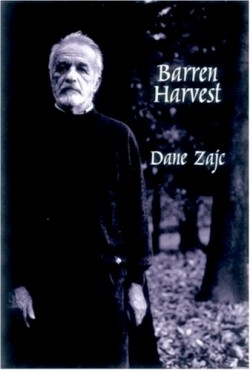Barren Harvest
Born in 1929 in the former Yugoslav Kingdom, this Slovenian author speaks from the rubble of World War II and Communism. Zajc lost two brothers to the Nazis, landed in jail as a “verbal delinquent,” and spent two forced years in the military. These struggles provided him with an emotional impetus for poetry that is attentive to landscape and its ability to reflect people, loss, and the relentless continuity of the natural world.
In Slovenia, Zajc co-founded the dissident publication Reivija 57 and co-edited the cultural journal Perspectives. He has also served as a Fulbright visiting writer at Columbia and his work has been heralded by Joseph Brodsky as “the great poetry of a small nation.” The first volume of Zajc’s poems available in English, this comprehensive selection shows a maturation from early angry laments to love poems both lush and consuming, although the edge of violence never quite dulls.
The book takes its title from an early poem, a rage for the death of the author’s brother. The poem builds with a repetition of tropes that reinforce both the primary, specific images and the sense of universal tragedy. The second stanza suggests that his brother is not the only one buried. The poem ends: “I remember you, brother. / Our mother recognized / your white teeth. / Your young white teeth / were the earth’s barren harvest.”
As in so much of Zajc’s poetry, the brother represents all of the persecuted dead turning the ground fertile. The apocalyptic images of war battle with the resiliency of the land, and in this case, of the word.
Although Zajc’s poetry invokes war and its aftermath, it is not reportage. Rather, it is witness of a sort, to an emotional life, resplendent with shadows and the relentless thrust of the earth to continue with its harvestings and sowings. Prevailing metaphors of light, birds, fire, clay, sky, herds, water, mouths, and the land create a landscape of motion and desire, perpetual as man is not. In “Bells of a New Day,” he writes: “You are alone in this world. / Like a rock is alone / and the wind sighs / past the mountain’s craggy face. / With only this to comfort them, / the broken bells of the herd / ring in the new day.”
Characteristically, underlying the suffering of humankind, animals trudge past, the wind continues its motion, the mountains stand silent. It is man who destroys man, victims of human infancy against the aged world. The poem “Scorpions” might best articulate Zajc’s vision: “they live with their stingers / pointed at their own hearts.” As readers make their way through this foreign yet familiar volume, they will understand that for these lines, and many others, they need only change the pronouns to face themselves.
Reviewed by
Camille-Yvette Welsch
Disclosure: This article is not an endorsement, but a review. The publisher of this book provided free copies of the book to have their book reviewed by a professional reviewer. No fee was paid by the publisher for this review. Foreword Reviews only recommends books that we love. Foreword Magazine, Inc. is disclosing this in accordance with the Federal Trade Commission’s 16 CFR, Part 255.

